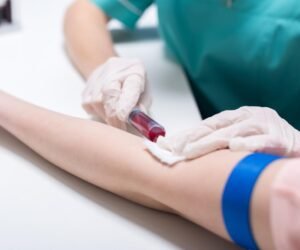FDA Approves First Blood Test for Colorectal Cancer Screening
In a groundbreaking development for cancer screening, the U.S. FDA approves colon cancer blood test. It has approved the shield blood test developed by Guardant Health as a primary screening tool for colorectal cancer. This marks the first-ever FDA-approved blood-based test for detecting colorectal cancer in adults aged 45. And older people who are at average risk.
Colorectal Cancer Screening: Where Does the Shield Liquid Biopsy Fit In?(FDA Approves First Blood Test for Colorectal Cancer Screening)
In July, the Food and Drug Administration (FDA) approved the first blood test to use as primary screening. For people at average risk for colon cancer.

Called Shield, the test looks for the presence of specific changes to DNA floating freely in the blood, called cell-free DNA. It indicates the presence of a tumor or precancerous growths in the colon.
The approval was based on findings from a study that involved nearly 8,000 people. Which is the test that detected colorectal cancers in more than 83% of the participants found to have colorectal cancer on colonoscopy? But its sensitivity for detecting precancerous growths in the colon was much lower, only about 13%.
Finding these precancerous lesions, called adenomatous polyps, is a strength of colonoscopy. Because the clinician performing the procedure can also remove them during the same procedure. Said Asad Umar, D.V.M., Ph.D., of NCI’s Division of Cancer Prevention, who was not involved in the study. In this sense, Dr. Umar added, colonoscopy can also help prevent colon cancer.
Although some experts said they are excited about the prospect of the Shield test to screen for colorectal cancer, they also cautioned that it’s unclear where the test fits in within the current screening paradigm for the disease, which includes other noninvasive screening options.
A simple blood test for colorectal cancer, added to a routine medical visit, takes a major step toward closing the screening gap.
Dr. Umar, referring to the fact that nearly one-third of people who are eligible for colorectal cancer screening don’t get screened. “But there are still important questions about how this test will perform among other available options.”
Those uncertainties include factors like how often people need to be tested and the cost of the test. But ultimately, Dr. Umar stressed, the most critical question to answer is if this test “has an impact on preventing colon cancer deaths.”
Shield demonstrates strong sensitivity for cancer, but not precancers
FDA based its approval on data from a large study called ECLIPSE, results of which were published earlier this year.
The study—funded by Guardant Health, the test’s manufacturer—enrolled about 23,000 people undergoing routine colorectal cancer screening by colonoscopy. Of these, a random selection of about 10,000 participants provided a blood sample for the study prior to colonoscopy, and the researchers were able to compare blood test results with colonoscopy results in nearly 8,000 participants.
Overall, in addition to its 83% sensitivity for identifying colorectal cancers and 13% of advanced precancerous polyps found by colonoscopy, the Shield test had a specificity of 90%. This means that among those who did not have cancer or advanced precancerous polyps, 90% had a negative result on the test. To be useful in screening, Dr. Umar said, a test must be both highly sensitive and highly specific.
“These numbers are on target for our performance goals of an effective cancer screening test and are in the range of [those from] other noninvasive colorectal cancer screening tests,” said Daniel Chung, M.D., a gastroenterologist at Massachusetts General Hospital, who led the ECLIPSE study.
The test’s sensitivity for detecting precancerous polyps was lower than that of colonoscopy, Dr. Chung noted. But if people who aren’t staying up to date with current screening recommendations are willing to use the blood test, he continued, “we would see higher rates of screening in the population as a whole and that could have a significant impact.”
Will the Shield test encourage more people to get screened?
In an NEJM editorial that accompanied the study’s results, John M. Carethers, M.D., of UC San Diego, agreed.
“Because the assay uses blood, thus avoiding the collection of stool, it may easily be prescribed and sent from any caregiver’s office as part of a standard blood draw, thus potentially increasing the use of colorectal cancer screening in multiple diverse populations,” Dr. Carethers wrote.
But in practice, the Shield test shares the same extra—and critical—step that stool tests require, he pointed out: if somebody has a positive result, meaning cancer or precancer may be present, they still have to get a colonoscopy.
And too often, studies have shown, that follow-up step doesn’t happen. The lack of follow-through after a positive FIT test can have significant consequences, with one study, for example, showing that those who didn’t have a follow-up colonoscopy were twice as likely to die from colorectal cancer as those who did.
Although many people may be more inclined to use a blood-based tests over a time-consuming colonoscopy or collecting stool for a FIT test, he noted, like Dr. Umar, that factors such as the test’s cost and how often it needs to be performed, will ultimately determine its impact in reducing colorectal cancer incidence and deaths.
Why This Approval Is a Big Deal
FDA approves colon cancer blood tests. Colorectal cancer is the second-leading cause of cancer-related deaths in the United States. Despite the availability of traditional screening methods like colonoscopies and stool-based tests, many people avoid them due to discomfort, inconvenience, or lack of access to medical facilities. The approval of the Shield test provides a less invasive, more accessible alternative, potentially increasing screening rates and enabling earlier cancer detection.
How the Shield Blood Test Works
The Shield test operates by detecting circulating tumor DNA (ctDNA) in the bloodstream. ctDNA consists of tiny fragments of genetic material shed by cancer cells into the blood. By identifying specific mutations associated with colorectal cancer, the test can help detect the disease at an early stage.
This simple blood draw can be conducted during routine medical visits, eliminating the need for bowel preparation, sedation, or stool sample collection—barriers that often prevent people from getting screened.
Effectiveness of the Test
Clinical trials have demonstrated the Shield test’s effectiveness.
✅ 83% sensitivity in detecting colorectal cancer (meaning it correctly identifies 83 out of 100 cases).
✅ 90% specificity, meaning it correctly rules out cancer in 90 out of 100 people who do not have it.
❌ 13% sensitivity for detecting advanced precancerous lesions, meaning it is not as effective in identifying precancerous growths compared to a colonoscopy.
Due to its lower sensitivity in detecting precancerous lesions. The Shield test is not a replacement for colonoscopy but rather an alternative for those who avoid traditional screening. If the test result is positive, doctors perform a follow-up colonoscopy to confirm the diagnosis. And remove any cancerous or precancerous growths.
Impact on Colorectal Cancer Screening Rates
Colorectal cancer is highly treatable when detected early. But nearly one-third of eligible adults in the U.S. do not follow recommended screening guidelines. With a blood test now available, healthcare providers expect that more people—especially those hesitant about colonoscopies—will undergo screening . Leading to earlier diagnosis and improved survival rates.
Additionally, the FDA’s approval paves the way for Medicare and private insurance reimbursement, making the test more accessible to a broader population.
How This Compares to Other Screening Methods
| Screening Method | Detection Rate for Cancer | Detection Rate for Precancerous Lesions | Invasiveness |
|---|---|---|---|
| Colonoscopy | ~95% | ~95% | High (requires sedation, bowel prep) |
| FIT (Fecal Immunochemical Test) | ~74% | ~24% | Low (stool test) |
| Shield Blood Test | 83% | 13% | Very Low (simple blood draw) |
While colonoscopy remains the gold standard. The shield test provides an easier alternative for those unwilling or unable to undergo traditional screening.
What This Means for the Future
With this approval, the era of blood-based cancer screening is here. Experts predict similar blood tests for lung, pancreatic, and ovarian cancer will become widely available soon.
The Shield test increases colorectal cancer screening rates, detecting cases earlier for more effective treatment and care.
Would you opt for a simple blood test over a colonoscopy? Let me know your thoughts in the comments below!
Conclusion: FDA approves colon cancer blood test
The FDA’s approval of the Shield blood test marks a significant step forward in cancer detection . Offering a convenient, less invasive alternative to traditional screening methods. By making colorectal cancer screening as simple as a routine blood draw . This test has the potential to increase participation rates, leading to earlier diagnoses and improved survival outcomes.
However, while the Shield test provides a promising new option . Colonoscopy remains the most effective tool for detecting and removing precancerous growths. Those who receive a positive result will still need a follow-up colonoscopy for confirmation and treatment.
Looking ahead, the success of this test could pave the way for similar blood-based screenings for other cancers . revolutionizing early detection and prevention strategies. As more people embrace these advancements . We move closer to a future where cancer is caught earlier and treated more effectively.
Would you choose a simple blood test over traditional screening methods? Share your thoughts in the comments below!
Article From: National Cancer Institute.

